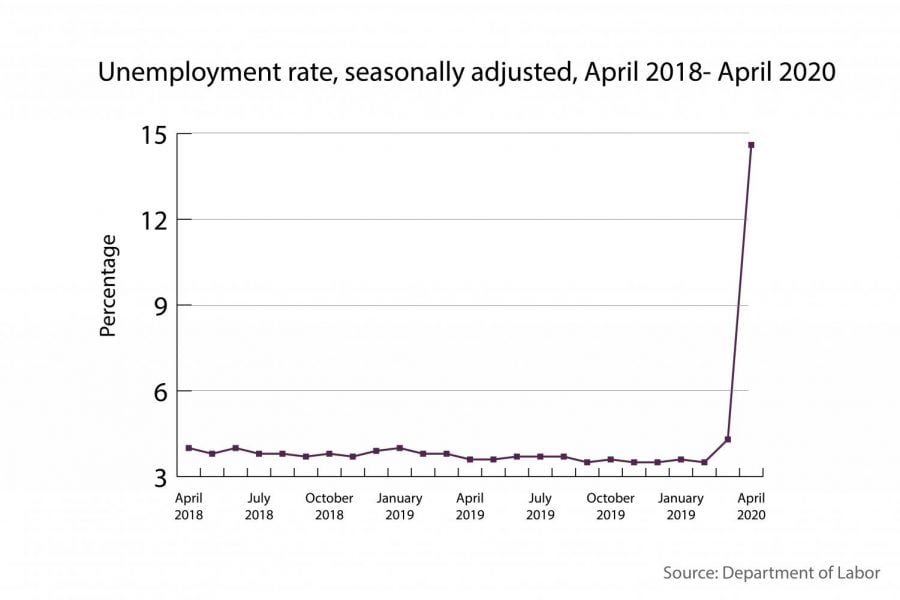As unemployment numbers jump, furloughed face uncertain future
In April, the national unemployment rate rose 10.3 percentage points to 14.7 percent.
May 12, 2020
In April, the national unemployment rate increased to 14.7 percent, and the number of unemployed people increased by 15.9 million, according to the US Department of Labor. It’s highest unemployment rate since the Great Depression.
The Evanston unemployment rate increased from 2.5 percent in February to 3.9 percent in March, which comes in light of Gov J.B. Pritzker’s stay-at-home orders that close non-essential businesses. Evanston Chamber of Commerce executive director Roger Sosa said Evanston unemployment numbers align with state and national statistics, though the city’s April figures have yet to be released.
Sosa added downtown businesses have reduced their payrolls by around 35 to 40 percent.
The city has also laid off eight full-time employees and furloughed employees, according to human resources division manager Jennifer Lin. She said the city has also instituted a hiring freeze on nonessential employees. Lin said the city is allowing the state unemployment office to approve any unemployment benefits for which those employees would be eligible.
Sosa said because so many sectors of the economy are intertwined, the rise in unemployment will have a ripple effect, which could be detrimental to areas like small businesses and housing.
He said when people have less money to spend, it will become harder for them to buy houses, which could force people to sell their homes at lower prices. In turn, Sosa said less housing sold results in a decreased need for construction workers, continuing the cycle of unemployment.
An uncertain future
Jaime Osborne, an employee at Bangers & Lace, 810 Grove St., was furloughed when Gov. J.B. Pritzker shut down restaurants and bars. Before the pandemic, Osborne was working up to 35 hours a week.
While the owners told Osborne they intended to provide some financial support during the furlough, Osborne, a graduate student at Roosevelt University, said she worried about paying rent and tuition.
Osborne was told she and her coworkers would all be offered their jobs back, but the uncertainty around the restaurant industry still remains.
“We don’t know what’s going to happen with our jobs so I don’t really know if I need to be looking for other jobs,” Osborne said. “I would love to go back to that job but none of us know what’s going to happen there.”
Before Pritzker announced Illinois’ first stay-at-home order, Evanston resident Caroline Ramey said she had a steady clientele as a dog walker. Since then, the pandemic has left her unemployed and reliant on her husband’s income from his factory job.
Ramey said her husband, a 54-year-old with diabetes and chronic obstructive pulmonary disease, puts himself at risk every time he goes to work. But with only one income, the couple has little choice but to take that risk.
Left in limbo by an unpredictable economy, Ramey is unsure if she should look for a new career, or hold out hope that her job will still exist in six months. She said the dangers of getting a new job right now are too high, as both she and her husband are at-risk and most available jobs require high levels of contact and most available jobs require high levels of contact.
“I can’t grieve my job because I don’t know if it’s not going to be there,” Ramey said. “That uncertainty does not let me resolve to say, ‘OK, I’m gonna move forward from here.’”
Looking for government help
Unemployed workers can apply for benefits through the Illinois Department of Employment Security and the Federal Pandemic Unemployment Compensation program.
But some have reported difficulties receiving unemployment benefits. Ramey said she applied for state benefits on March 30, and still has not received any money. She applied as a self-employed individual and didn’t qualify for any benefits. Ramey said she’s now waiting for her application to be transferred from IDES to the federal program.
Some, like Divine Tagro, owner of Divine African Hair Braiding, have used the federal stimulus checks to cover costs. Tagro is the only employee at her business, which currently is closed because of the stay-at-home order.
Tagro said she tried to apply for unemployment benefits, but gave up once she received the stimulus check because the process wasn’t working for her. While non-essential businesses are closed and social-distancing standards have kept her from seeing clients, Tagro said she still has bills to pay.
“At this moment, all of us need government help, but I don’t know where to go to get help,” Tagro said.
Email: [email protected]
Twitter: @delaneygnelson












